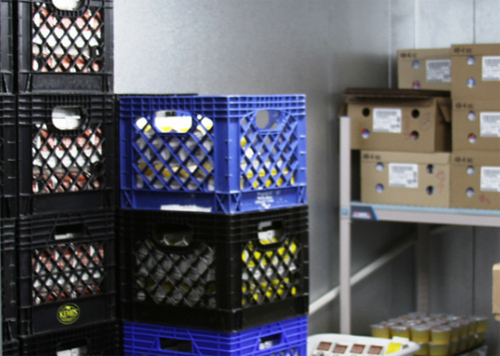Industry, News, Refrigeration
Reducing Food Waste in Commercial Refrigerators

Who among us isn't frustrated when we throw away spoiled food? It's basically taking your money and throwing it into the garbage. Following these tips for reducing food waste in commercial refrigerators will save you money and improve your bottom line when it comes to your inventory.
Don't Overfill Your Refrigerator
If you fill your refrigerator too full, there won't be enough room for the air to circulate and thus, causes the food to spoil more quickly. Leave at least three inches of open space around all containers to ensure proper airflow. Additionally, leave room near the ceiling and keep bottom shelves six inches off the floor.
Label Your Food and Follow FIFO Guidelines
Clearly label your food with contents and dates. Then make sure all employees follow a strict FIFO policy: First In, First Out. This ensures proper inventory turnover and reduces food spoilage and waste.
Keep Your Food Well Organized
When your food is well organized, it's much easier to see what you have, access it, and actually use it. If your food is stored haphazardly, it's hard to find and could end up forgotten. Group similar foods together and avoid storing food in such a way that it is not easily visible.
Proper Temperature
Daily temperature checks are a must for safely storing food inventory. Make sure your refrigeration unit is set to the correct temperature for the food you are storing. These documents from the USDA and the Minnesota Department of Health contain helpful information about food temperature safety.
Where you store your food in the refrigerator makes a difference. Generally, the coldest part of the refrigerator is the lower shelves toward the back of the unit. This is where you should keep your temperature-sensitive foods, like raw meat, fish, etc. Warmer areas are near the front of the refrigerator and near the ceiling.
Regular Maintenance
In the food industry, refrigeration is hugely important to operations. If the refrigeration goes down, you are at risk of your entire inventory spoiling. Don't wait for a problem to arise- make preventative maintenance a priority. Consider a maintenance agreement to ensure properly timed checkups.
Our experienced technicians can help keep your equipment running at peak efficiency, spot potential issues before they happen, and play an important role in reducing food waste in commercial refrigerators. Get in touch today!
recent posts
categories
archives
- October 2018
- November 2018
- December 2018
- January 2019
- February 2019
- March 2019
- April 2019
- May 2019
- June 2019
- July 2019
- August 2019
- September 2019
- October 2019
- November 2019
- December 2019
- January 2020
- February 2020
- March 2020
- April 2020
- May 2020
- June 2020
- July 2020
- August 2020
- September 2020
- October 2020
- November 2020
- December 2020
- May 2021
- November 2021